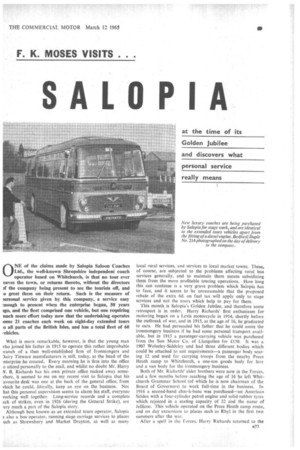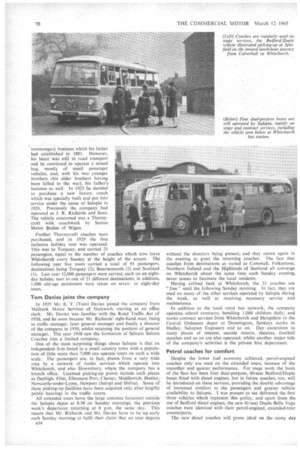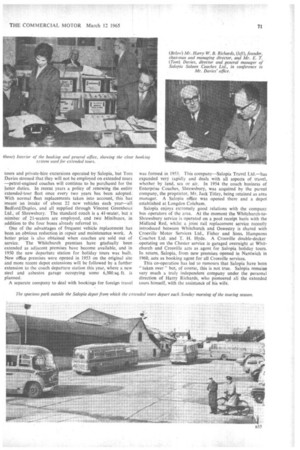SALOPIA
Page 71

Page 72

Page 73

If you've noticed an error in this article please click here to report it so we can fix it.
F. K. MOSES VISITS . .
ONE of the claims made by Salopia Saloon Coaches Ltd., the well-known Shropshire independent coach operator based on Whitchurch, is that no tour ever eaves the town, or returns thereto, without the directors A the company being present to see the tourists off, and :o greet them on their return. Such is the measure of 3ersonal service given by this company, a service easy nough to present when the enterprise began, 50 years tgo, and the fleet comprised one vehicle, but one requiring nuch more effort today now that the undertaking operates ;onrie 21 coaches each week on eight-day extended tours o all parts of the British Isles, and has a total fleet of 60 fehkles.
What is more remarkable, however, is that the young man vho joined his father in 1915 to operate this rather improbable 'ranch of a then well-established firm of Ironmongers and )airy Tinware manufacturers is still, today, at the head of the mterprise he created. Every morning he is first into the office
o attend personally to the mail, and whilst no doubt Mr. Harry V. B. Richards has his own private office tucked away somevhere, it seemed to me on my recent visit to Salopia that his savourite desk was one at the back of the general office, from vhich he could, literally, keep an eye on the business. Not hat this personal supervision seems to alarm his staff, everyone vorking well together. Long-service records and a complete ack of strikes, even in 1926 (during the General Strike), are 'cry much a part of the Salopia story.
Although best known as an extended tours operator, Salopia s also a bus operator, running stage carriage services to places uch as Shrewsbury and Market Drayton, as well as many local rural services, and services to local market towns. These, of course, are subjected to the problems affecting rural bus services generally, and to maintain them means subsidizing them from the more profitable touring operations. How long this can continue is a very grave problem which Salopia has to face, and it seems to be unreasonable that the proposed rebate of the extra 6d. on fuel tax will apply only to stage services and not the tours which help to pay for them.
This month is Salopia's Golden Jubilee, and therefore some retrospect is in order. Harry Richards' first enthusiasm for motoring began on a Levis motorcycle in 1914, shortly before the outbreak of war, and in 1915. at the age of 16, he graduated to cars. I4e had persuaded his father that he could assist the ironmongery business if he had some personal transport available, but in 1915 a passenger-carrying vehicle was purchased from the Sun Motor Co. of Llangollen for £150. It was a 1907 Wolseley-Siddeley and had three different bodies which could be attached to suit requirements—a passenger body seating 12 and used for carrying troops from the nearby Prees Heath camp to Whitchurch, a one-ton goods body for hire and a van body for the ironmongery business.
Both of Mr. Richards' elder brothers were now in the Forces, and a few months before reaching the age of 16 he left Whitchurch Grammar School (of which he is now chairman of the Board of Governors) to work full-time in the business. In 1916 a second-hand char-a-banc was purchased—an American Selden with a four-cylinder petrol engine and solid-rubber tyres which rejoiced in a seating capacity of 32 and the name of Jellicoe. This vehicle operated on the Frees Heath camp route, and on day excursions to places such as Rhyl in the first two summers after the war.
After a spell in the Forces, Harry Richards returned to the B33
ironmongery business which his father had established in 1881. However, his heart was still in road transport and he continued to operate a mixed bag, mostly of small passenger vehicles, and, with his two younger brothers (his elder brothers having been killed in the war), his father's business as well. In 1925 he decided to purchase a new luxury coach which was specially built and put into service under the name of Salopia in 1926. Previously the company had operated as J. R. Richards and Sons. The vehicle concerned was a Thornycroft with coachwork by Santus Motor Bodies of Wigan.
Further Thornycroft coaches were purchased, and in 1929 the first inclusive holiday tour was operated. This was to Torquay, and carried 21 passengers, equal to the number of coaches which now leave Whitchurch. every Sunday at the height of the season. The following year five tours carried a total of 93 passengers, destinations being Torquay (2), Bournemouth (2) and Scotland (1). Last year 12,000 passengers were carried, each on an eightday holiday tour to one of 21 different destinations; in addition, 1,000 old-age pensioners were taken on sevenor eight-day tours.
Tom Davies joins the company In 1935 Mr. E. T. (Tom) Davies joined the company from Vfaibank Motor Services of Nantwich, starting as an office clerk. Mr. Davies was familiar with the Road Traffic Act of 1930, and he soon became Mr. Richards right-hand man, rising to traffic manager. later general manager and finally a director of the company in 1950, whilst retaining the position of general manager. The year 1938 saw the formation of Salopia Saloon Coaches into a limited company.
One of the most surprising things about Salopia is that an independent firm based in a small country town with a poi/illation of little more than 7,000 can operate tours on such a wide scale. The passengers are, in fact, drawn from a very wide area by a network of feeder services which operate into Whitchurch, and also Shrewsbury, where the company has a branch office. Licensed picking-up points include such places as Denbigh, Flint, Ellesmere Port, Chester, Middlewich, Hanley, Newcastle-under-Lyme, Newport (Salop) and Shifnal. Some of these 'picking-up facilities have been acquired only after lengthy public hearings in the traffic courts.
All extended tours leave the large concrete forecourt outside the Salopia depot at 8.30 on Sunday mornings, the previous week's departures returning at 8 p.m. the same day. This means that Mr. Richards and Mr. Davies have to be up early each Sunday morning to fulfil their .claim that no tour departs B34 without the directors being present, and they return again in the evening to greet the returning coaches. The fact that coaches from destinations as varied as Cornwall, Folkestone, Northern Ireland and the Highlands of Scotland all converge on Whitchurch about the same time each Sunday evening, never ceases to fascinate the local residents.
Having arrived back at Whitchurch, the 21 coaches are "free" until the following Sunday morning. In fact, they are used on many of the other services operated by Salopia during the week, as well as receiving necessary service and maintenance.
In addition to the local rural bus network, the company operates. school contracts, handling 1,000 children daily, and works contract services from Whitchurch and Shropshire to the Central Ordnance depot at Donnington, Sankeys works in Hadley, Salopian Engineers and so on. Day excursions to many places of interest, seaside resorts, theatres, football matches and so on are also operated, whilst another major side of the company's activities is the private hire department.
Petrol coaches for comfort Despite the lower fuel economy achieved, petrol-engined coaches only are used on the extended tours, because of the smoother and quieter performance. For stage work the basis of the fleet has been four dual-purpose, 40-seat Bedford/Duple buses fitted with diesel engines, but in future coaches, too, will be introduced on these services, providing the double advantage of increased comfort to the passengers and greater vehicle availability to Salopia. I was present to see delivered the first three vehicles which represent this policy, and apart from the use of Bedford diesel engines, the new 41-seat Duple Bella Vega coaches were identical with their petrol-engined, extended-tour counterparts.
The new diesel coaches will prove ideal on the many day tours and private-hire excursions operated by Salopia, but Tom Davies stressed that they will not be employed on extended tours —petrol-engined coaches will continue to be purchased for the latter duties. In recent years a policy of renewing the entire extended-tour fleet once every two years has been adopted. With normal fleet replacements taken into account, this has meant an intake of about 22 new vehicles each year—all Bedford/Dui:11es, and all supplied through Vincent Greenhous' Ltd., of Shrewsbury. The standard coach is a 41-seater, but a number of 21-seaters are employed, and two Minibuses, in addition to the four buses already referred to.
One of the advantages of frequent vehicle replacement has been an obvious reduction in repair and maintenance work. A better price is also obtained when coaches are sold out of service. The Whitchurch premises have gradually been extended as adjacent premises have become available, and in 1950 the new departure station for holiday tours was built. New office premises were opened in 1953 on the original site and more recent depot extensions will be followed by a further extension to the coach departure station this year, where a new steel and asbestos garage occupying some 6,500 sq. ft. is planned.
A separate company to deal with bookings for foreign travel was formed in 1955. This company—Salopia Travel Ltd.—has expanded very rapidly and deals with all aspects of travel, whether by land, sea or air. In 1954 the coach business of Enterprise Coaches, Shrewsbury, was acquired by the parent company, the proprietor, Mr. Jack Tilley, being retained as area manager. A Salopia office was opened there and a depot established at Longden Coleham.
Salopia enjoys extremely good relations with the company bus operators of the area. At the moment the Whitchurch-toShrewsbury service is operated on a pool receipt basis with the Midland Red; whilst a joint rail replacement service recently introduced between Whitchurch and Oswestry is shared with Crosville • Motor Services Ltd., Fisher and Sons, Hampsons Coaches -Ltd. and T. H. Hyde. A Crosville double-decker .operating on the Chester service is garaged overnight at Whitchurch and Crosville acts as agent for Salopia holiday tours. In return, Salopia, from new premises opened in Nantvvich in 1960, acts as booking agent for all Crosville services.
This co-operation has led to rumours that Salopia have been "taken over" but, of course, this is not true. Salopia remains very much a truly independent company under the personal direction of Harry Richards, who pioneered all the extended tours himself, with the assistance of his wife.
























































































































